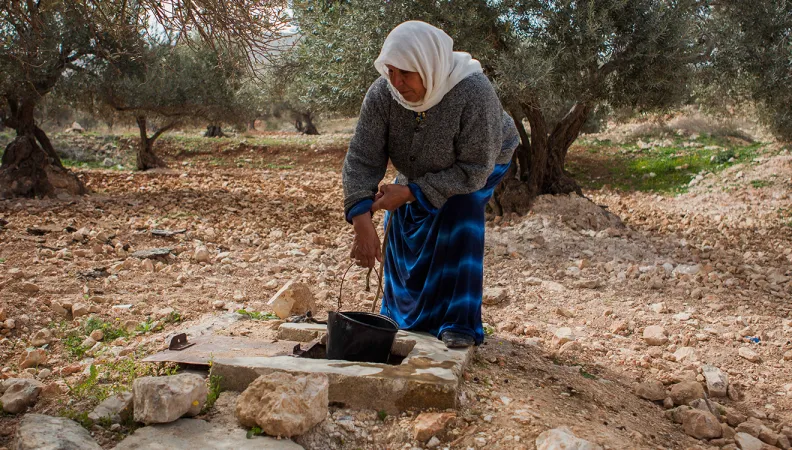Share the page
The paracommons of Palestinian water

-
Project start date
-
2016Status
Completed
-
Project end date
-
2020
-
AFD financing amount
-
173 748
-
Country and region
-
Location
-
Palestine
-
Partners
-
French National Centre for Scientific Research (CNRS)
-
Research program
In the Palestinian territories, water, as a circulating resource, is shared among several actors, including at the local level. Mobilizing the concept of "commons", this research program aimed to understand the governance of water resources in Palestine and how it is possible to articulate the rights of different users to develop a deliberative and equitable governance.
Context
International donors have intervened massively in the Palestinian Territories since 1994. A large part of this financing has enabled the mobilization of new water resources and an increase in the efficiency of water use in an arid territory. They assumed that the Oslo accords and the Palestinian water law reflected the reality of water management.
The introduction of new principles through the Oslo Accords and national resource management by the Palestinian Water Authority (PWA) has weakened the social norms that governed the functioning of traditional governments. This has given rise to complex local situations in which different registers of recognition of rights of access to the resource are exercised.
It is therefore important to understand how each of the pathways followed by water drawn from a common reservoir, whether it is a well or a source, is part of bundles of rights and how bundles of rights are now affected by projects funded by donors: who appropriated the water made available by these projects? Under what terms? Who lost it?
Goal
This research programme focused on the political dimension of the construction and transformation of commons. It sought to understand the current governance of the “paracommons” of water in Palestine − the term “paracommons” denoting potential material gains from improving the efficiency of systems drawing from a common reservoir of natural resources, such as water.
The programme also examines how to harness the existing bundles of rights within the commons of water to develop a deliberative and equitable governance.
Method
The programme organised three types of seminars: seminars with the members of the programme, research seminars, and "action-research seminar" which involved, in addition to the researchers, farmers in the studied areas, members of the Food and Agriculture Organization (FAO), members of Palestinian agricultural NGOs, as well as members of the Palestinian Ministry of Agriculture and of the PWA.
The fieldwork, which was very substantial, mainly took place during the first 24 months of the programme. Subsequent fieldwork was carried out to triangulate the results obtained by metrology, mapping and qualitative surveys. The results were disseminated through publications, seminars and panels at international conferences.
Results
The program led to the publication of several peer-reviewed journal articles: Geoforum, Journal of Political Ecology, Environment and Planning E: Nature and Space, International Journal of Water Resources Development.
Many interventions have taken place related to the program, including:
- AFD’s 12th international conference on development in 2016 on the theme of “Common and development”;
- Stockholm World Water Week 2017;
- The first Palestinian International Water Forum (IWF) held in 2018.
The results were also disseminated to the general public through press and radio interviews, conferences and training sessions.
Lessons learned
The research project highlighted “the usefulness of recognizing the commons governing irrigation water. It harnesses the commons to understand the power interactions at play in transformations over local, national and international scales. It proposes to harness the positive externalities commons generate in order to transform political and economic interactions at the national and international scales. Although it uses a Palestinian case study, this conceptual development can apply anywhere. Palestinians have long managed irrigation as commons at the local level. But the overwhelming attention paid to their national struggle has led most researchers to focus on national institutions instead. It has also favored treating water as a stock rather than a flow (…) that is managed successively by a variety of institutions. At the local level, it allows us to understand the interactions between smallholders and neighboring agribusinesses, for example. It allows us to understand the upheaval in power interactions when a merchant economy attempts to supplant a human economy. At the national level, it allows us to address the governance of the paracommons. (…) Addressing the governance of the paracommons of Palestinian irrigation is now urgent.” (Trottier, 2018)
To go further:
- “Harnessing the commons to govern water as a flow” (Julie Trottier, July 2018)
- “Palestinian water laws: between centralization, decentralization, and rivalries” (Jeanne Perrier, November 2020)
- “The institutionalization of irrigation and the effects thereof: The case of the Palestinian water user associations” (Jeanne Perrier, November 2020)
Contacts:
- Julie Trottier, director of research at CNRS
- Stéphanie Leyronas, research officer at AFD
